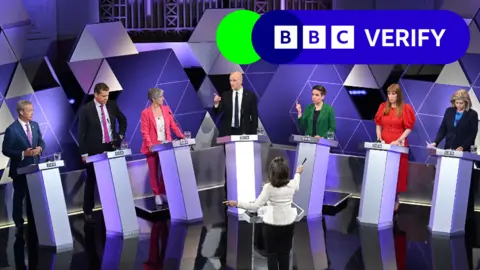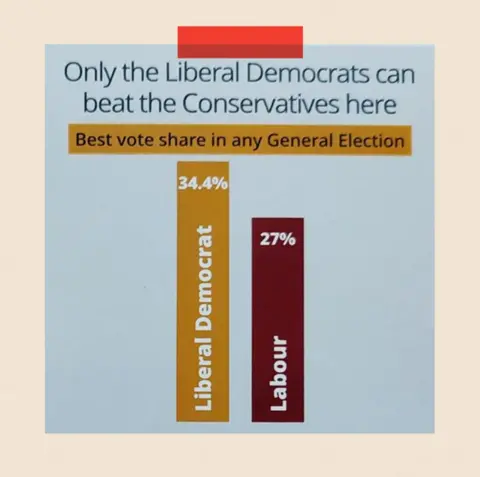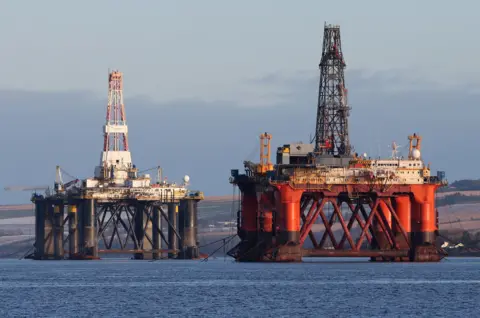ARTICLE AD BOX

 BBC
BBC
BBC Verify has been fact-checking the political parties during this election campaign and seen some questionable claims at the forefront of the debate.
If you are still making up your mind before heading to the polls, here is what you need to know about some of the potentially misleading statements the parties have made.
Tories claim Labour spending would put taxes up by £2,000 per family
This figure risks misleading people because it adds up four years of supposedly extra taxes resulting from Labour’s manifesto spending plans.
It was asserted by Rishi Sunak 11 times in the first leaders’ debate and he has been using it on social media ever since.
That is not what you would normally think of if somebody said your taxes were going up by £2,000 - you'd think they meant in a single year.
The Office for Statistics Regulation has said “someone hearing the claim would have no way of knowing that this is an estimate summed together over four years”.
The Conservatives also said the costings of Labour’s plans were worked out by impartial civil servants, but some are based on assumptions made by politically appointed special advisers. Labour disputes the figures.
Labour claim Conservative spending would mean £4,800 extra on your mortgage
This figure - unveiled at a press conference by the shadow chancellor Rachel Reeves - is based on some questionable assumptions about how much the Conservatives would have to borrow if they won the election and the impact of this borrowing on Bank of England interest rates.
It has been posted multiple times on Facebook and also posted on X by Keir Starmer and Rachel Reeves.
The Conservatives say they will be able to pay for their planned tax cuts by saving £12bn a year from the welfare bill. Labour's calculations assume they would make none of these savings at all, which is probably unrealistic.
Also, the £4,800 figure is the supposed extra mortgage costs on a household added up over five years, not the cost falling in a single year, which risks misleading people.
The statistics regulator has called for more context and transparency around how this figure was reached.
Liberal Democrat bar charts
The Liberal Democrats’ election literature has had a heavy emphasis on tactical voting in this election and, as in other years, has used a lot of bar charts.
In one constituency in this campaign, a leaflet shows the party’s local vote share in 2010 and Labour’s share in 2017, two cherry picked years.
The claim that "only the Liberal Democrats can beat the Conservatives here" is misleading.
If they had selected 2019, then the chart would have shown the Lib Dems on 15.1% and Labour on 24.8%.
The chart also misses out the vote share of the Conservatives who have actually held the seat since 2010.

 LibDems
LibDems
The Office for Statistics Regulation says “polling or election results data should be visualised in a way that does not mislead the average reader about the relative support for different parties”.
Some Lib Dem campaign literature - as well as some produced by other parties in areas of the country - does not pass that test.
Other leaflets have used local election results as a guide to the general election, which can be unreliable, or they have exaggerated the size of their bars in the chart to boost their apparent performance.
Reform UK claims migrants in small boats could be returned to France
Picking up small-boat migrants in the English Channel and returning them to France is a core Reform UK pledge. Party chairman Richard Tice has repeatedly claimed the UK is legally entitled to do this.
But there is no evidence that this is the case.
While international maritime laws allow a state to pick people up at sea if they are “in danger of being lost”, they do not allow them to be taken to another state without that country agreeing.
According to James M Turner KC, a shipping lawyer at Quadrant Chambers: "The French would have to grant express permission for UK vessels to carry rescued people through their territorial waters and to leave them ashore in France."
Ainhoa Campàs Velasco, a maritime law expert from the University of Southampton, said migrants could not be returned to French shores “without prior agreement with France".
There is no such agreement between the UK and France. Mr Tice says he has his own legal advice but has not shared this, despite a request from BBC Verify.
The SNP claims Labour’s North Sea oil plans risk 100,000 jobs

 PA
PA
One-hundred-thousand is roughly the number of jobs that Scotland’s oil and gas industry supports in the wider economy but it is misleading for the SNP Westminster leader Stephen Flynn to repeatedly suggest Labour’s plans put all of these jobs at risk.
Labour has said it would not issue new oil and gas licences, but it has also pledged not to overturn existing licences.
And the Climate Change Committee, the government's independent adviser, has said there is potential for the move to renewable energy to "create more jobs than will be lost" across the UK.
The Greens’ claims on their tax plans
Co-leader Adrian Ramsay has said that the tax-to-GDP ratio that the Green Party is proposing would take us closer to where the average European country is and that the UK is currently right at the bottom.
In fact, in 2021 the UK raised more from taxes as a share of the economy (33.5%) than European countries such as Ireland, Switzerland, Latvia and Lithuania.
And by 2027-28 the UK tax take is already on course to move to 37.7%, close to the average of Western European countries.
The Green Party manifesto proposes to raise up to £151bn a year from new taxes by 2029 - an increase of about 4.5% of GDP.
If implemented on top, this would take the UK tax share to about 42% of GDP, higher than the current Western European average.
Plaid claims the UK government owes Wales £4bn because of HS2
If the high speed rail project HS2 had been an “England-only” spending scheme, something called the Barnett Formula might have kicked in.
This is intended to ensure when public spending goes up on England-only projects, the devolved administrations in Scotland, Wales and Northern Ireland automatically get a proportional sum of extra cash to spend how they see fit.
Plaid leader Rhun ap Iorwerth said that “in line with usual compensation rules, Wales is owed some £4bn” - based on the estimated £66bn cost of the HS2 project.
But the project was not classed as England only and rail infrastructure is not an area devolved to Wales so there's no automatic release of the HS2 money to Wales under the Barnett framework.
Plaid wants to replace Barnett with a “needs-based funding formula”.
But the independent Institute for Fiscal Studies think tank warns such a reform wouldn’t necessarily mean more funding for Wales because Wales already receives about 20% more for services than is spent on comparable services in England.



 6 months ago
30
6 months ago
30








 English (US) ·
English (US) ·